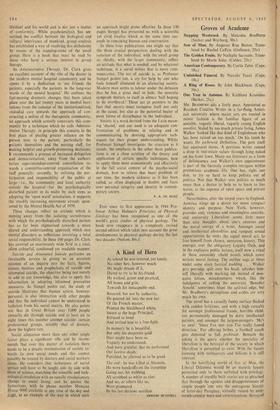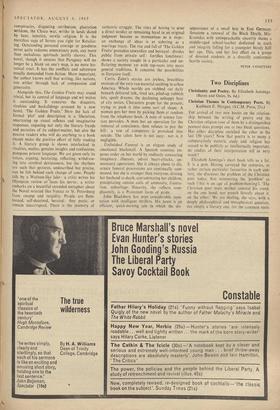Groves of Academe
Son .of Man. By Augusto Roa Bastos. Trans- 18s.) One Year in Autumn. By Kathleen Kranidas. (Barker, 21s.)
MR. BRADBURY sets a lively pace. Appointed as Resident Creative Writer in a far-flung Ameri- can university where major arts are treated in minor fashion is the familiar figure •of an amiable, vaguely liberal, vaguely young English novelist. Staled by too much private living, James Walker 'looked like that kind of Englishman who has been rained on too much.' On his tomb he wants He eschewed Definition. The post itself has equivocal status. A previous writer caused a drop in real-estate values through lying naked on his front lawn. Many see literature as a form of delinquency and Walker's own appointment is part of the furtively complex intrigues within pretentious academic life. One has, sighs one don, to try so hard to keep politics out of politics. Not that Walker sees politics as much more than a device to help us to learn to live worse, at the expense of open space and private people.
Nevertheless, after the torpid years in England, America stings up a desire for more compact identity and purpose. New York, however, provides only violence and meaningless anarchy, and university Liberalism seems little more than nice thoughts about one's enemies and the moral energy of a trout. Amongst social and intellectual absurdities and rampant sexual opportunities he seeks the signal moral act, to free himself from chance, unreason, history. This emerges over the obligatory Loyalty Oath, and in the explosive public lecture, itself now a ritual in these ostensibly ribald novels which cover serious moral feeling. The outline sags at times under some stock farcical padding . . . Walker gets porridge spilt over his head; splashes him- self liberally with marking ink instead of mos- quito lotion, misadventures which, like the indulgence of calling the university 'Benedict Arnold,' sometimes blunt the satirical edge, but Mr. Bradbury's perceptions and asides are very much his own.
The novel has a casually funny surface flecked with sudden lyricisms, and with a high casualty list amongst professional frauds, horrible child- ren permanently damaged by dotty intellectual parents, and amongst the jargon-mongers. 'He's so anal.' Since I've met you I've really found direction.' For offering bribes, a football coach gels demoted to full professor. Beneath the joking is the query whether the speciality of liberalism is the betrayal of the society in which liberalism is permitted to exist. With the future looming with technocrats and billions it is still relevant.
In the horrifying world of Son of Man, the Liberal Dilemma would be an esoteric luxury permitted only to those surfeited with privilege. A number of sturdily built stories are so *ached that through the agonies and disappointments of simple people 'one sees the outrageous history of latter-day Paraguay, virtually ruined by nine- teenthLcentury wars and exterminations. Betrayed
conspiracies, disgusting retribution, plantation serfdom, the Chaco war, writhe in lands dazed by heat, injustice, servile religion. It is the merciless saga of Serves you right for Retaliat- ing. Outstanding personal courage or goodness never quite redeems unnecessary pain, any more than melodious spirituals justify slavery. This novel, though it ensures that Paraguay will no longer be a blank on one's map, is no mere his- torical tract. It has the conflicts and adventure usually demanded from fiction. More important, the author knows well that writing, like nations, can wither through lack of compassion and generosity.
Alongside this, The Golden Fruits may sound trivial, but its control of language and wit makes it outstanding. It concerns the disquiets, rivalries and backslidings aroused by a new novel, 'The Golden Fruits.' Here the lack of formal 'plot' and description is a liberation, smartening up visual reflexes and imaginative responses, exposing not only the literary frauds and parasites of its subject-matter, but also the passive readers who will do anything to a book except make the positive effort of fully reading it. A literary group is shown interlocked in rivalries, malice, genuine insights and confusions, pompous private language. We are given only its voices, arguing, hesitating, reflecting, withdraw- ing into cerebral deviousness, but the rhythms are such that gestures, undescribed but precise, can be felt behind each change of tone. People talk by a Watteau-like lake : a critic writes his Olympian review or 'loses his nerve: a writer embarks on a beautiful extended metaphor about the Novel wrested like Venice or St. Petersburg from swamp and turgidity. People are flum- moxed, self-deceived, berated : they panic, or remain uncorrupted. There is the intensity of authentic struggle. The risks of having to utter a direct verdict or remaining loyal to an original judgment become as momentous as a siege: an exchange of ideas is as sobering as a marriage treaty. The rise and fall of 'The Golden Fruits' provokes cowardice and betrayal: divides public from private self: fortifies loneliness: shows a society caught in a particular and un- flattering moment yet with tap-roots into more general traditions. It concetns the possibilities in literature itself.
Curtis 'Zahn's stories are joyless, breathless motions of the very, raw material seething in urban America. Whole worlds are stubbed out daily beneath defeated talk, tired sex, piled-up rubbish lots, spoilt dreams. the deafening unhappy beat of city noises. Characters grope for the present, trying to push it into some sort of shape. A woman gets her men by picking them at random from the telephone book. A note of science fan- tasy pervades. A man has an operation for the removal of conscience, then refuses to pay the bill: a row of computers is provoked into suicide. The talent here is not easy: nor is it negligible.
Unfinished Funeral is an elegant study of emotional blackmail. A Spanish countess im-. poses order on her world by endlessly concocting imaginary illnesses, adroit heart-attacks, un- necessary operations. She is always about to die, ornate funeral processions are continually sum- moned, but she is stronger than everyone, driving her husband to death, contaminating her children, precipitating outsize coils of animosity, frustra- tion, subterfuge. Sincerity, she reflects com- placently, is a Protestant form of pride.
John Blackburn has won considerable repu- tation with intelligent thrillers. His latest is an efficient, quick-moving tale in which the dis-
appearance of a small boy in East Germany threatens a renewal of the Black Death. Mis, K ranidas with unimpeachable sincerity shows a middle-aged school-teacher dedicated to truth and integrity falling for a youngster bhrely half her age. This, and her live effect on a group of devoted students in a drearily conformist Seattle society.
PETER VANSITTART































 Previous page
Previous page